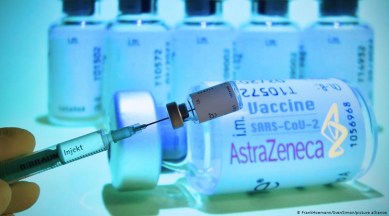Stay updated with the latest - Click here to follow us on Instagram
AstraZeneca: EU regulator set to announce vaccine ruling
Germany, France, Spain and others temporarily halted vaccinations with the British-Swedish shot after EU member states reported 30 cases of blood clot disorders, including a rare and difficult-to-treat condition called cerebral venous thrombosis (CVT).

The European Medicines Agency (EMA) is set to announce its ruling on the safety of the AstraZeneca COVID-19 vaccine on Thursday after 13 EU member states suspended its use.
The EMA is holding a special meeting to look into the connection between unusual blood clot disorders discovered in several cases after people had received the AstraZeneca vaccine.
Germany, France, Spain and others temporarily halted vaccinations with the British-Swedish shot after EU member states reported 30 cases of blood clot disorders, including a rare and difficult-to-treat condition called cerebral venous thrombosis (CVT).
Some 5 million people have so far been administered the AstraZeneca COVID-19 vaccine in the EU.
Why did Germany suspend the AstraZeneca vaccine?
The German Health Ministry described its suspension of the vaccine on Monday as a “precaution” on the basis of advice from the state health regulator, the Paul Ehrlich Institute (PEI).
Seven people aged between 20 and 50 were diagnosed with CVT up to 16 days after vaccination, the PEI reported on Monday. They would have expected just one case among the 1.6 million who have been given the jab.
Health Minister Jens Spahn said Germany would await the ruling by the EMA before reintroducing the vaccine.
What have international regulators said about the AstraZeneca vaccine?
The EMA Executive Director Emer Cooke said on Tuesday that there was no connection between the AstraZeneca vaccine and the blood clots reported in some vaccine recipients. She also stressed the importance of building trust in the safety of the vaccines.
On Wednesday the World Health Organization (WHO) said that it was also carrying out an investigation into the blood clots in AstraZeneca vaccine recipients but recommended that countries continue to administer jabs as they deemed the benefits to outweigh the costs.
AstraZeneca outside the EU
The AstraZeneca vaccine is one of the cheaper options on the market. The WHO vaccine sharing initiative COVAX has relied heavily on the jab — which is being produced not-for-profit during the pandemic.
Unlike the BioNTech-Pfizer or Moderna vaccines, the AstraZeneca shot does not need to be kept at ultra-low temperatures, making it easier to store in less developed countries or less accessible areas.
Some 25 African countries have already been given doses of the AstraZeneca vaccine through the COVAX program. However, some of them have now joined the growing list of countries to suspend its use.
Experts have warned that this may hamper the uptake of the virus in countries where people are already skeptical of the virus or of vaccines in general.
Britain, which has administered 11 million doses of the vaccine already, has continued to use it after determining that the rate of blood clots among vaccine recipients was no greater than in the general population.